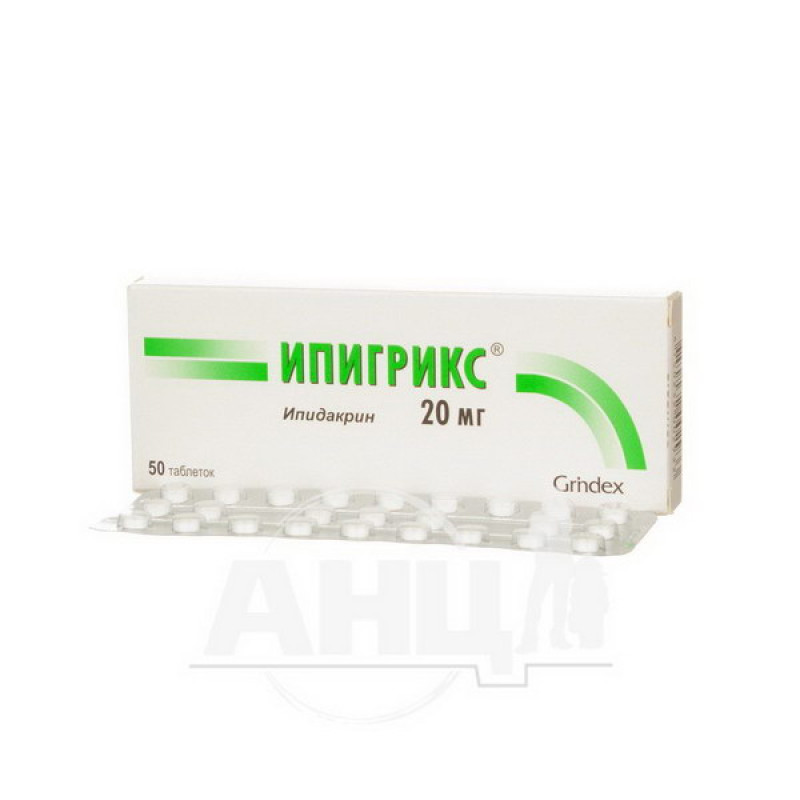Ipigrix tablets 20 mg blister No. 50

Pharmacological properties
Pharmacodynamics. Ipidacrine is a drug that has a biologically beneficial combination of two molecular effects: blockade of membrane potassium permeability and inhibition of cholinesterase. with blockade of membrane potassium permeability playing a crucial role.
Blockade of potassium permeability of the membrane causes primarily the prolongation of the repolarization phase of the action potential of the excited membrane and an increase in the activity of the presynaptic axon. This leads to an increase in the entry of calcium ions into the presynaptic terminal, which in turn causes an increase in the release of the mediator into the presynaptic cleft in all synapses. An increase in the concentration of the mediator in the synaptic cleft contributes to a strong stimulation of the postsynaptic cell due to the mediator-receptor interaction. In cholinergic synapses, inhibition of cholinesterase causes an even greater accumulation of the neurotransmitter in the synaptic cleft and an increase in the functional activity of the postsynaptic cell (contraction, conduction of excitation).
Ipidacrine enhances the effects of acetylcholine, adrenaline, serotonin, histamine, and oxytocin on smooth muscles.
Ipidacrine exhibits the following pharmacological effects:
stimulation and restoration of neuromuscular transmission; restoration of impulse conduction in the peripheral nervous system after its blockade by various agents (trauma, inflammation, the action of local anesthetics, some antibiotics, potassium chloride, toxins, etc.); increased contractility of smooth muscle organs; specific moderate stimulation of the CNS with individual manifestations of a sedative effect; improvement of memory and learning ability; analgesic effect.Ipidacrine does not have teratogenic, embryotoxic, mutagenic, carcinogenic, allergenic and immunotoxic effects, and does not affect the endocrine system.
Pharmacokinetics. After oral administration, it is rapidly absorbed from the digestive tract. C max is reached in blood plasma 1 hour after administration. From the blood, it quickly enters the tissues, and in the stabilization stage in plasma only 2% are recorded, T ½ in the distribution phase is 40 min. 40-50% of Ipidacrin binds to plasma proteins. It is absorbed mainly from the duodenum, slightly less from the small intestine and ileum, only 3% of the dose is absorbed in the stomach. Excretion from the body is carried out by a combination of renal and extrarenal mechanisms (biotransformation, secretion with bile), with urinary secretion prevailing. Only 3.7% of the drug is excreted in the urine unchanged, which indicates rapid metabolism in the body.
Indication
Diseases of the peripheral nervous system (neuropathies, neuritis, polyneuritis and polyneuropathies, myelopolyradiculoneuritis), myasthenia and myasthenic syndrome of various etiologies;
bulbar palsies and paresis; memory impairment of various etiologies (Alzheimer's disease and other forms of senile mental impairment); mental retardation in children; recovery period of organic lesions of the CNS, accompanied by motor disorders; in the complex therapy of multiple sclerosis and other forms of demyelinating diseases of the nervous system; intestinal atony.Application
Tablets are used internally.
For neuritis - 1 tablet 2-3 times a day. The course of treatment is from 10-15 days for acute neuritis to 20-30 days for chronic neuritis. If necessary, repeat the course of treatment 2-3 times with an interval of 2-4 weeks until the maximum effect is achieved.
For myelopolyradiculoneuritis and paresis - 1 tablet 2-3 times a day for 30-40 days. Repeat the treatment courses several times with a break of 1-2 months until the therapeutic effect is achieved.
For myasthenia and myasthenic syndromes - 1-2 tablets 2-3 times a day. In severe forms, the dose can be increased to 200 mg/day (2 tablets 5 times a day after 2-3 hours). Treatment is course, alternating with classical anticholinesterase drugs.
For multiple sclerosis and other forms of demyelinating diseases of the nervous system, bulbar paralysis - 1 tablet 3-5 times a day for 60 days 2-3 times a year.
For Alzheimer's disease and other forms of senile mental impairment, start with a dose of 1-2 tablets per day, divided into 2 doses, gradually increasing the dose by 2 tablets per week to 6-10 tablets per day (2 tablets 3-5 times a day).
Duration of treatment - from 4 months to 1 year. Course therapy is possible - 4-5 months with a break of 1-2 months.
In organic lesions of the CNS, accompanied by motor disorders - 1 tablet 2-3 times a day. The average course of treatment is 30 days. If necessary, the course of treatment can be repeated.
For intestinal atony - 1 tablet 1-3 times a day. The course of treatment is 1-3 weeks.
Children over 12 years of age with mental retardation and peripheral nervous system diseases should be prescribed 1 tablet (20 mg) 2-3 times a day. The course of treatment is 1-2 months, depending on the clinical picture.
Children. The drug can be used in children over 12 years of age.
Contraindication
Hypersensitivity to Ipidacrine and/or other components of the drug; epilepsy; extrapyramidal disorders with hyperkinesis; angina pectoris; severe bradycardia; BA; vestibular disorders; mechanical obstruction of the intestines and urinary tract; gastric or duodenal ulcer in the acute stage.
Classification of the frequency of adverse reactions: very common (≥1/10); common (≥1/100-1/10); uncommon (≥1/1000-1/100); rare (≥1/10,000-1/1000); very rare (1/10,000), including isolated cases; unknown (cannot be determined from the available data).
Possible side effects are associated with disruption of M-cholinergic receptors.
On the part of the heart: often - palpitations, bradycardia, chest pain.
From the nervous system: infrequently (when using high doses) - dizziness, headache, drowsiness, general weakness, muscle cramps.
From the respiratory system, chest organs and mediastinum: infrequently - increased secretion of bronchial secretions, bronchospasm.
On the part of the digestive system: often - salivation, nausea; infrequently (when using high doses) - vomiting; rarely - diarrhea, pain in the epigastric region.
Hepatobiliary disorders: unknown - jaundice.
From the skin and subcutaneous tissue: often - increased sweating; infrequently - after taking high doses, allergic reactions are possible, including urticaria, angioedema, itching, rash.
From the reproductive system: unknown - increased uterine tone.
Salivation and bradycardia can be reduced by cholinergic receptor blockers (atropine, etc.). In case of undesirable effects, the dose should be reduced or the drug should be discontinued for a short time (1-2 days).
Special instructions
Use with caution in patients with a history of gastric and duodenal ulcers, respiratory diseases, including acute respiratory diseases, cardiovascular diseases not associated with coronary pain, and thyrotoxicosis.
Ipigrix tablets contain lactose, therefore patients with rare hereditary forms of galactose intolerance, lactase deficiency or glucose-galactose malabsorption syndrome should not take them.
Use during pregnancy and breastfeeding. Ipidacrine increases uterine tone and may cause premature labor, so its use is contraindicated during pregnancy.
The use of Ipidacrine is contraindicated during breastfeeding.
The ability to influence the reaction rate when driving or operating other mechanisms. Ipidacrine may cause a sedative effect, so caution should be exercised when driving.
Interactions
Ipidacrine enhances the sedative effect in combination with drugs that suppress the function of the central nervous system. The effect and side effects are enhanced when used simultaneously with other cholinesterase inhibitors and m-cholinomimetic drugs.
With simultaneous use with cholinergic agents in patients with myasthenia gravis, the risk of developing cholinergic crisis increases. The risk of developing bradycardia increases if β-adrenergic blockers are used before starting treatment with Ipidacrine.
Ipidacrine can be used in combination with nootropic drugs.
Alcohol increases the side effects of the drug.
Cerebrolysin improves the effect of Ipidacrine on the psyche.
Overdose
In severe forms of the disease, a cholinergic crisis may develop.
Symptoms: bronchospasm, lacrimation, increased sweating, constriction of the pupils, nystagmus, increased peristalsis of the digestive tract, spontaneous defecation and urination, vomiting, jaundice, bradycardia, cardiac conduction disorders, arrhythmias, decreased blood pressure, anxiety, agitation, feelings of fear, ataxia, convulsions, coma, speech disorders, drowsiness, general weakness.
Treatment: symptomatic therapy. Use of M-cholinergic blockers (atropine, trihexyphenidyl, methotrexate iodide).
Storage conditions
At a temperature not exceeding 25 °C.
There are no reviews for this product.
There are no reviews for this product, be the first to leave your review.
No questions about this product, be the first and ask your question.
















